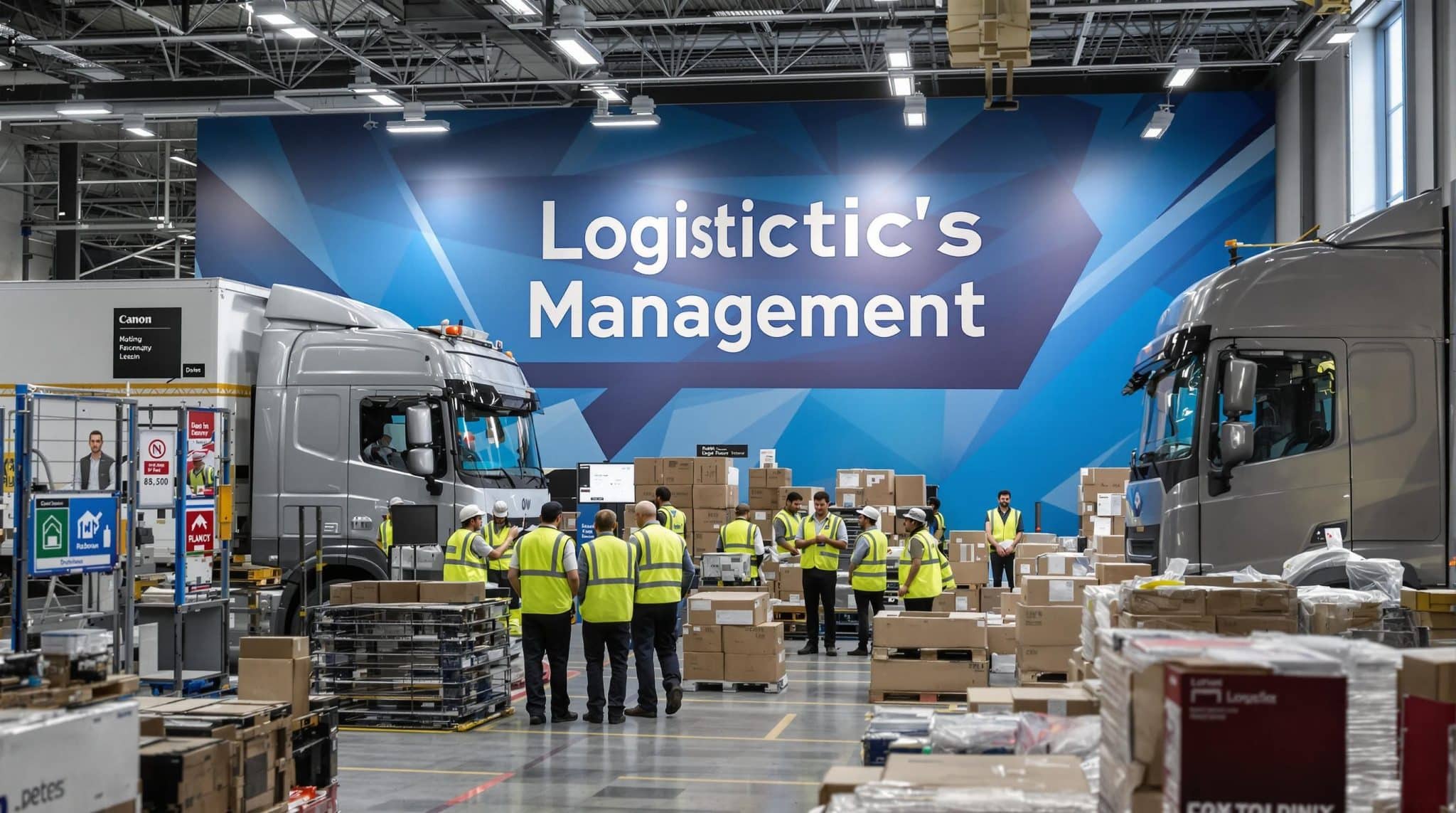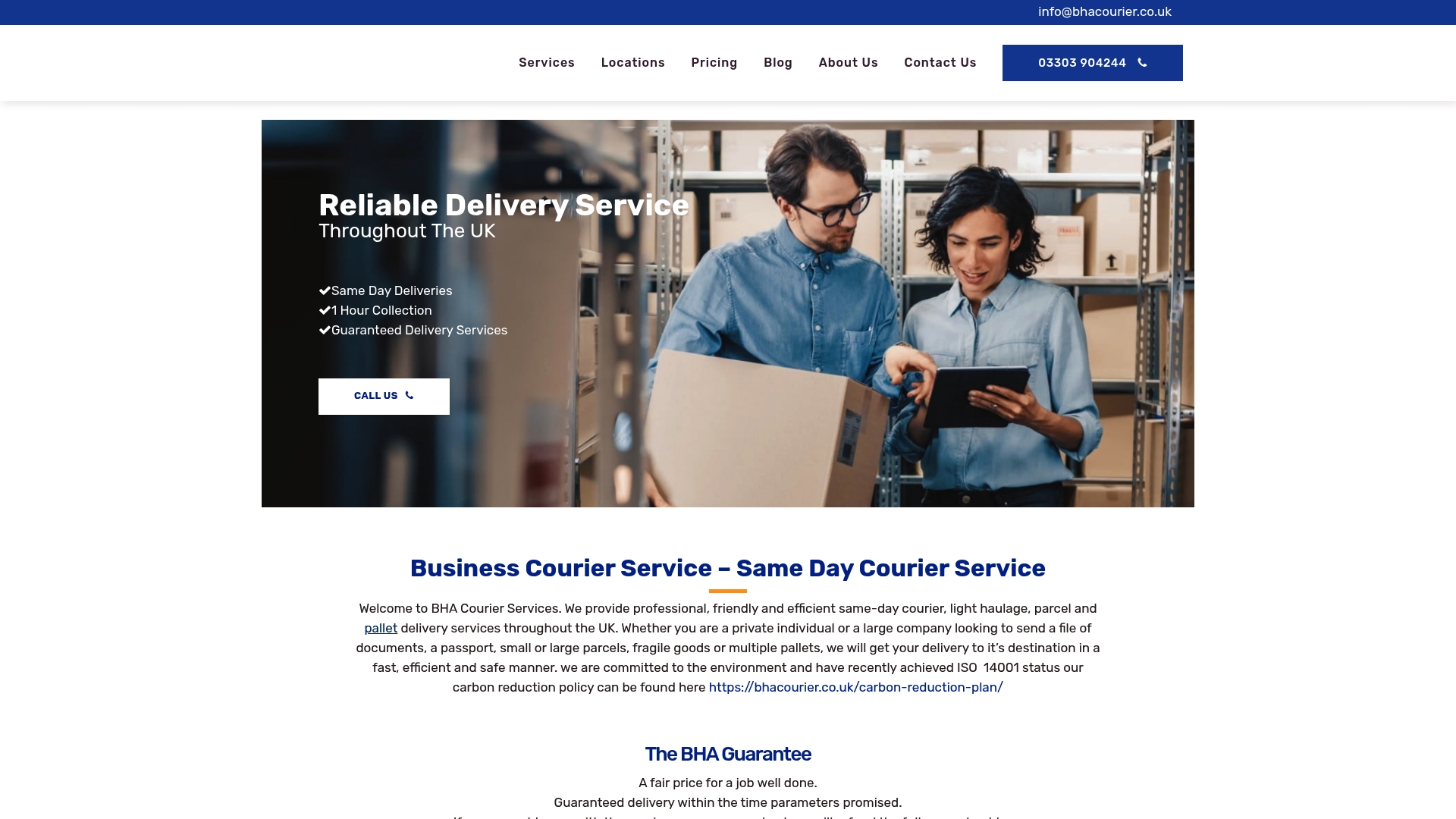
26 Jul What Is Logistics Management? Guide for UK Businesses 2025
Logistics management has become the heartbeat of every successful UK business, driving everything from swift deliveries to cost control. Yet, despite this, many still overlook how logistics shapes the bigger picture of competitiveness and growth. The real shock is that targeted investment in logistics could boost the UK’s GDP by £3.9 billion each year by 2030, which means logistics is not just a backroom operation but a major engine for national prosperity.
Table of Contents
- Defining Logistics Management And Its Key Elements
- How Logistics Management Helps UK Businesses
- Modern Trends In Logistics Management For 2025
- Choosing The Right Logistics Solutions In The UK
Quick Summary
| Takeaway | Explanation |
|---|---|
| Logistics management enhances business efficiency | Effective logistics management streamlines transportation, inventory, and resource allocation, leading to significant operational improvements. |
| Advanced technology transforms logistics processes | Embracing AI, quantum computing, and digital twins can significantly enhance predictive capabilities and operational efficiency in logistics. |
| Sustainability is essential for modern logistics | Implementing green logistics strategies can reduce environmental impact while also boosting brand reputation and customer loyalty. |
| Strategic logistics build supply chain resilience | Proactive logistics management mitigates risks associated with disruptions, allowing businesses to adapt quickly to changes in the market. |
| Choosing the right logistics solutions is crucial | Assessing logistics needs and evaluating providers ensures businesses enhance efficiency and meet customer demands effectively. |
Defining Logistics Management and Its Key Elements
Logistics management represents a critical strategic function for businesses seeking to optimise their operational efficiency and competitive advantage. At its core, logistics management is the comprehensive process of planning, implementing, and controlling the movement and storage of goods, services, and related information from the point of origin to the point of consumption.

The Fundamental Components of Logistics Management
The scope of logistics management extends far beyond simple transportation. According to North Carolina State University’s Supply Chain Resource Cooperative, logistics management involves strategically managing procurement, movement, and storage of materials to maximise current and future profitability through cost-effective order fulfillment.
Key components of logistics management include:
- Transportation Management: Coordinating and optimising the movement of goods across various transportation modes
- Inventory Control: Maintaining optimal stock levels to meet customer demand while minimising holding costs
- Warehousing: Efficiently storing and managing goods to ensure quick retrieval and distribution
- Order Fulfillment: Processing and delivering customer orders accurately and promptly
Here’s a table that summarises the key components of logistics management and their core responsibilities:
| Component | Responsibility |
|---|---|
| Transportation Management | Optimising movement of goods across transport modes |
| Inventory Control | Maintaining optimal stock levels, minimising holding costs |
| Warehousing | Storing and managing goods for quick retrieval and distribution |
| Order Fulfillment | Processing and delivering orders accurately and promptly |
Strategic Importance in Modern Business
In today’s complex global marketplace, logistics management has become increasingly sophisticated. TechTarget’s enterprise resource planning research highlights that effective logistics management helps organisations plan and implement processes that enable seamless goods movement and storage.
Businesses that excel in logistics management can achieve significant competitive advantages. This includes reducing operational costs, improving customer satisfaction, enhancing supply chain responsiveness, and creating more agile business models. By integrating advanced technologies and data-driven strategies, companies can transform logistics from a basic operational function into a strategic asset.
The ultimate goal of logistics management is to ensure that the right products reach the right place, at the right time, and in the right condition while maintaining cost efficiency. This requires a holistic approach that considers multiple interconnected elements such as transportation networks, inventory systems, warehousing infrastructure, and technological integration.
For UK businesses, mastering logistics management means staying ahead in an increasingly competitive and globalised marketplace. It demands continuous innovation, adaptability, and a commitment to understanding and meeting evolving customer expectations.
By developing robust logistics management strategies, organisations can create smoother, more predictable supply chains that not only meet but exceed customer requirements, ultimately driving business growth and sustainability.
How Logistics Management Helps UK Businesses
Logistics management serves as a critical strategic lever for UK businesses, enabling them to navigate complex market challenges and achieve sustainable growth. By implementing sophisticated logistics strategies, companies can transform operational efficiency and create substantial competitive advantages across multiple business dimensions.
Enhancing Operational Efficiency and Cost Reduction
For UK businesses, effective logistics management directly translates into significant operational improvements. According to HM Revenue and Customs, companies utilizing advanced supply chain management systems experience marked increases in productivity and decision-making capabilities.
Key efficiency benefits include:
- Streamlined Transportation: Optimising delivery routes and reducing unnecessary movement
- Inventory Precision: Minimising excess stock and associated holding costs
- Resource Allocation: Deploying workforce and assets more strategically
- Technology Integration: Leveraging digital tools for real-time tracking and management

Driving Economic Growth and Competitiveness
Logistics management extends beyond internal operational improvements. Logistics UK reports that targeted investment in logistics could potentially boost the UK’s GDP by 3.9 billion annually by 2030, highlighting its macroeconomic significance.
Businesses that master logistics management can achieve remarkable competitive advantages. This includes faster response times, improved customer satisfaction, and the ability to adapt quickly to market changes. For those looking to explore efficient delivery solutions across different regions, our guide to same-day courier services in Luton offers valuable insights into optimising local logistics networks.
Strategic Supply Chain Resilience
In an increasingly complex global marketplace, logistics management provides UK businesses with a critical tool for building supply chain resilience. Government research emphasises that proactively managing supplier relationships and implementing robust logistics strategies can significantly enhance overall business performance.
By developing comprehensive logistics management approaches, UK businesses can:
- Mitigate risks associated with supply chain disruptions
- Create more flexible and adaptive operational models
- Improve forecasting and demand planning
- Enhance sustainability and environmental compliance
The ability to quickly respond to market changes, manage resources efficiently, and deliver exceptional customer experiences positions logistics management as a fundamental driver of business success in the contemporary UK economic landscape.
Businesses that invest in sophisticated logistics management are not merely managing goods and services they are building strategic capabilities that enable long-term growth, resilience, and competitive differentiation in an increasingly dynamic global marketplace.
Modern Trends in Logistics Management for 2025
As we approach 2025, logistics management is experiencing a profound technological transformation, driven by emerging technologies and evolving business requirements. The landscape of logistics is rapidly shifting, presenting UK businesses with unprecedented opportunities for innovation and efficiency.
Artificial Intelligence and Advanced Analytics
Artificial intelligence is revolutionising logistics management, offering unprecedented capabilities in predictive analysis and operational optimization. Research from computational logistics studies highlights how large language models are transforming supply chain decision-making, enabling more intelligent and autonomous systems.
Key developments in AI-driven logistics include:
- Predictive Demand Forecasting: Using machine learning to anticipate market shifts
- Intelligent Route Optimization: Dynamically adjusting transportation routes in real-time
- Automated Inventory Management: Implementing smart systems that predict stock requirements
- Enhanced Risk Management: Identifying potential supply chain disruptions before they occur
Quantum Computing and Digital Twin Technologies
Cutting-edge technologies are redefining logistics management capabilities. Quantum computing research demonstrates remarkable potential for solving complex logistical optimization problems, particularly in network design and fleet maintenance. Digital twin technologies are emerging as powerful tools for creating virtual replicas of physical logistics systems, enabling unprecedented simulation and strategic planning.
Businesses seeking deeper insights into advanced delivery solutions can explore our comprehensive same-day courier services in London to understand how technology is transforming modern logistics.
Sustainability and Ethical Logistics
Sustainability is no longer an optional consideration but a critical component of modern logistics management. UK businesses are increasingly adopting green logistics strategies that reduce environmental impact while maintaining operational efficiency. This includes:
- Implementing electric and low-emission vehicle fleets
- Developing carbon-neutral shipping strategies
- Investing in renewable energy for warehousing and transportation
- Creating circular supply chain models that minimize waste
To illustrate how modern trends are shaping logistics management strategies, here’s a table summarising the emerging technologies and sustainability practices discussed:
| Trend / Practice | Description |
|---|---|
| Artificial Intelligence (AI) | Enables predictive forecasting, route optimisation, and automated inventory management |
| Quantum Computing | Solves complex optimisation problems for network design and fleet maintenance |
| Digital Twin Technologies | Creates virtual replicas for detailed simulation and strategic planning |
| Electric/Low-Emission Vehicle Fleets | Reduces carbon footprint in transportation |
| Carbon-Neutral Shipping Strategies | Offsets or eliminates emissions in delivery operations |
| Renewable Energy in Logistics | Powers warehouses and transport with sustainable energy sources |
| Circular Supply Chain Models | Minimises waste through reuse, recycling, and responsible resource management |
The convergence of technological innovation and sustainability represents the future of logistics management. Businesses that successfully integrate advanced technologies with ethical practices will gain significant competitive advantages in the rapidly evolving global marketplace.
By embracing these emerging trends, UK businesses can transform logistics from a traditional operational function into a strategic enabler of growth, innovation, and responsible business practices. The logistics management landscape of 2025 promises to be more intelligent, efficient, and adaptable than ever before.
Choosing the Right Logistics Solutions in the UK
Selecting the appropriate logistics solution is a critical strategic decision for UK businesses, directly impacting operational efficiency, customer satisfaction, and overall competitive positioning. The complexity of modern logistics demands a nuanced approach that considers multiple factors and aligns with specific business objectives.
Assessing Organisational Logistics Requirements
The UK government’s Business Support guidance emphasises the importance of understanding comprehensive logistics procedures and selecting shipping methods that match organisational needs. Businesses must conduct a thorough evaluation of their specific requirements, considering factors such as:
- Delivery Volume and Frequency: Understanding the scale and consistency of shipping needs
- Geographic Coverage: Identifying the required transportation reach
- Time Sensitivity: Determining critical delivery windows
- Budget Constraints: Balancing cost-effectiveness with service quality
Technology Integration and Supply Chain Management
Government research on IT systems highlights the transformative potential of advanced technological solutions in logistics management. Modern businesses require logistics partners that offer robust digital capabilities, including:
- Real-time tracking systems
- Comprehensive reporting and analytics
- Seamless integration with existing business platforms
- Automated communication and updates
For businesses seeking flexible and efficient delivery solutions across different regions, our Bristol same-day courier services demonstrate how localised expertise can meet specific logistical challenges.
Evaluating Logistics Solution Providers
Choosing the right logistics solution involves a comprehensive assessment of potential providers. Key evaluation criteria should include:
- Proven track record of reliability
- Technological capabilities
- Flexibility and adaptability
- Compliance with industry standards
- Environmental sustainability practices
- Cost-effectiveness
- Customer support and communication
Here is a table listing important criteria for evaluating logistics solution providers and why each is crucial for UK businesses:
| Criterion | Why It Matters |
|---|---|
| Reliability | Ensures consistent and on-time deliveries |
| Technological Capabilities | Supports efficiency through digital systems and tracking |
| Flexibility and Adaptability | Handles changing business needs and unexpected challenges |
| Compliance with Standards | Meets regulatory requirements and industry norms |
| Environmental Sustainability | Aligns with ethical values and regulatory expectations |
| Cost-Effectiveness | Balances quality of service with financial considerations |
| Customer Support | Provides fast, effective communication and problem resolution |
Businesses must look beyond immediate operational requirements and consider long-term strategic alignment. The ideal logistics solution should not only address current needs but also provide scalability and adaptability for future growth.
Successful logistics management in the UK requires a holistic approach that combines technological innovation, strategic planning, and a deep understanding of specific business requirements. Companies that invest time and resources in selecting the right logistics solutions position themselves for enhanced operational efficiency, improved customer experiences, and sustainable competitive advantage.
Ultimately, the right logistics solution is not a one-size-fits-all proposition but a tailored strategy that reflects the unique characteristics and ambitions of each individual business. By approaching logistics management with strategic insight and technological awareness, UK businesses can transform their supply chain from a basic operational function into a powerful driver of organisational success.
Frequently Asked Questions
What is logistics management?
Logistics management is the process of planning, implementing, and controlling the movement and storage of goods, services, and related information from the origin point to the point of consumption. It focuses on optimising efficiency and enhancing customer satisfaction.
Why is logistics management important for UK businesses?
Effective logistics management is vital for UK businesses as it enhances operational efficiency, reduces costs, and improves customer satisfaction. It also plays a crucial role in building supply chain resilience and driving economic growth in the UK.
What are the key components of logistics management?
Key components of logistics management include transportation management, inventory control, warehousing, and order fulfillment. Each component focuses on essential activities that ensure the smooth flow of goods and services within a supply chain.
How do modern trends impact logistics management in 2025?
Modern trends, such as artificial intelligence, quantum computing, and sustainability practices, are transforming logistics management. These advancements enable predictive analysis, optimisation of resources, and the implementation of environmentally friendly strategies, making logistics operations more efficient and responsible.
Take Control of Your Logistics and Deliver with Confidence
Struggling with unpredictable deliveries, rising operational costs and the uncertainty of secure shipments? As highlighted in our guide to logistics management, UK businesses face real challenges in balancing efficiency, speed and reliability. These pain points can undermine your efforts to streamline supply chains, adapt to fast-moving markets, or simply ensure your shipments reach their destination on time and in perfect condition.

BHA Courier turns these challenges into opportunities. Experience seamless, secure and rapid courier solutions trusted by businesses nationwide. With our same-day and next-day delivery expertise, plus robust systems for time-critical goods, you benefit from real-time tracking, ISO 14001 environmental certification and customer service focused on your peace of mind. Ready to transform your logistics strategy and gain the competitive edge that agile businesses need in 2025? Visit our main site now and unlock the professional courier solutions that power success across the UK. Make every delivery count—discover the BHA Courier advantage today.


